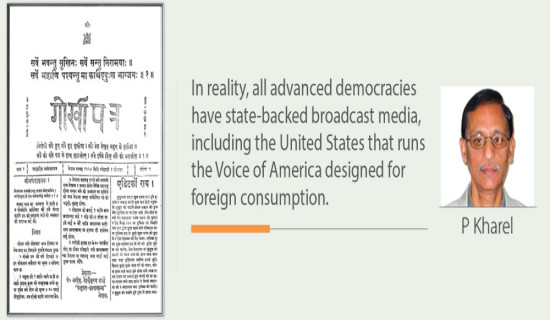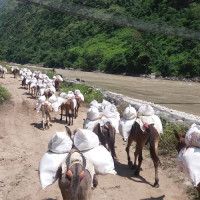- Monday, 6 May 2024
Key Issues In Nepal’s Export Trade
Nepal has adopted several export-promoting initiatives over the years to increase commodity production and exports, but none have been as effective as expected. Consequently, the country has been suffering from a substantial trade imbalance, even when it comes to essential goods.
In FY 2022/23, Nepal’s exports amounted to NPR 157.140 billion in comparison to its imports totaling a whopping NPR 1.611 trillion, with the country facing a trade deficit of NPR 1.454 trillion in the fiscal year, which clearly shows that the government is not giving due importance to export promotion despite the significant imports of exports. Nepal’s struggle with poor export performance hinders economic growth and competitiveness as a whole.
There are some cross-cutting and logistic-related issues that need to be overcome by both the private and government sectors in order to attract foreign investment, strengthen manufacturing industries in Nepal, and boost export trade in the days ahead.
These include understanding and complying with international trade regulations, tariffs, quotas, and trade agreements that may affect all sectors. Efficient transportation networks, including shipping, air freight, and road infrastructure, are crucial for timely delivery and cost-effective exports across various sectors. Nepal, being located uniquely geographically, has its constraints, being landlocked, and access to it is governed by bilateral laws with neighbouring countries.
Identifying and navigating market access barriers such as licensing requirements, standards, tariff and non-tariff measures, and certification processes in target markets for all sectors can be achieved through contacts with government and business support associations.
Ensuring smooth supply chains, from sourcing raw materials to delivering finished products, is very essential, especially when it comes to planning the flow of money from buyers to exporters or to different actors in the supply chain within and beyond borders. The flow of information and the flow of goods need equal attention, as there are various activities involved and regulations to be complied with.
Meeting international quality standards and regulations for products is imperative to maintaining competitiveness in global markets, as there are mandatory and special requirements as well as different market preferences within EU countries and other regions. Safeguarding intellectual property rights for products, technologies, and services to prevent unauthorised use or infringement in international trade is another factor that needs utmost attention.
Adhering to environmental regulations and sustainable practices in manufacturing, agriculture, and forest product harvesting to meet market demands and regulatory requirements with a special focus on social equity and economics has been very demanding under the GRID (Green, Resilience, and Inclusive Development). Conducting market research to understand consumer preferences, trends, and demand dynamics in target markets across all sectors is necessary by contacting embassies as well as trade promotion centers in Nepal and importing countries.
Managing currency exchange fluctuations and financial risks associated with international trade transactions, including payment methods and hedging strategies, is another important problem often faced by exporters as well as importers. Nepal has a foreign exchange control system, and therefore it is important to follow Nepal Rastra Bank’s monetary policy as well as the daily foreign exchange rate. Addressing cultural issues, language barriers, and business etiquette when engaging in international trade across diverse markets with special attention to customs authorities can help ensure the smooth movement of goods and services across countries and sectors.
The above-mentioned cross-cutting issues can help exporters enhance their competitiveness and maximise opportunities in international trade.
Import process scrutiny
Meanwhile, an importer needs to consider many things when importing goods and services from a landlocked, least developed mountainous country like Nepal. They need to understand the logistical challenges associated with importing from a landlocked country, such as longer transit times, reliance on neighbouring countries for transit routes, and potential delays due to rugged terrain or weather conditions. Delayed goods at transit or transshipment points or transit-providing countries are very common and need proper planning.
They need to familiarise themselves with customs procedures, import regulations, and border clearance requirements specific to importing from Nepal, including documentation, tariffs, and duties.
It is important to be aware of potential infrastructure limitations in Nepal, such as inadequate road networks, limited access to ports, and constraints in transportation and storage facilities, which may affect the efficiency and cost of imports. Therefore, experienced freight forwarders with links along the supply chain need to be chosen.
They need to assess the political and economic stability of Nepal, as well as any potential risks associated with importing from a developing country, including regulatory changes, geopolitical tensions, and social unrest. They need to develop contingency plans and alternative supply chain routes to mitigate risks associated with disruptions in transportation, customs clearance, or other logistical challenges that may arise when importing from a landlocked country like Nepal. They need to consider the environmental and social impact of importing goods and services from Nepal and prioritise suppliers who adhere to sustainable practices and ethical standards in their operations. They need to conduct thorough market research to assess the demand for imported goods and services in their target market and ensure that the products sourced from Nepal align with consumer preferences, quality expectations, and regulatory requirements.
It is important to overcome communication barriers, quality control standards, regulatory requirements, payment and financial considerations by establishing secure and reliable payment methods for transactions with Nepalese suppliers. Considering factors such as currency exchange rates, banking infrastructure, financial stability, etc. can help navigate the challenges and capitalise on the opportunities associated with importing goods and services from Nepal.
EU: potential market
Identifying a special market for exports in the European Union involves several steps. It is essential to conduct comprehensive market research to understand the demographics, consumer preferences, and trends in the importing country. Look for niche segments or underserved markets that align with available products or services. It is also important to know the government agencies in the importing countries to meet their regulatory compliances.
Analyse the industry landscape in the importing country to identify sectors with high growth potential or specific needs that one’s offerings can address. Consider factors such as the regulatory environment, competitive landscape, and market dynamics. Business support agencies from both the government and the private sector can be very helpful in this regard.
Build relationships with local businesses, industry associations, trade organisations, and government agencies in the importing countries by engaging in networking activities to gain insights into market opportunities and access potential partners or distributors.
Attend trade shows, exhibitions, and industry events in the importing country to showcase one’s products or services, connect with potential customers, and gather market intelligence. These events provide valuable opportunities to identify special market segments and gauge interest in one’s offerings.
Evaluate different market entry strategies, such as direct sales, partnerships, licensing agreements, or joint ventures, based on the characteristics of the special market segment and one’s business objectives. Tailoring one’s approaches to effectively penetrate and serve the identified market through governments and business support organisations is quite important.
Customer feedback is the key to improving product quality and services. Seeking feedback from potential customers or industry stakeholders in the importing country to validate market demand for one’s products or services, as well as adjusting offerings, pricing, or marketing strategies based on customer insights to better meet the needs of the special market segment, can be a key factor in success.
Segment the importing country's market based on various criteria, such as geographic location, demographics, psychographics, or behaviour patterns. Identify segments that exhibit unique characteristics or requirements that make them suitable for targeted marketing efforts; what works well in one geographic location or community culture may not work in another context.
Assess the size and growth potential of the special market segment within the importing country to determine its attractiveness and viability for business. Considering such factors will help in estimating market opportunities. This can be done through contact with related commodity associations in the importing countries.
Understanding the regulatory framework, cultural norms, and business practices in the importing country that may impact one’s market entry and operations and adapting marketing strategies and messaging to resonate with the cultural preferences of the special market segment can help mitigate these issues.
Continuously monitoring market trends, consumer behaviour, and competitive dynamics in the importing country is important to stay abreast of any changes in trends and preferences. Therefore, adapt one’s strategies accordingly. It is important to be agile and responsive to evolving market conditions to maximise one’s success in the special market segment.
Based on the above information related to trade and transport logistics, prospective exporters of Nepal and importers from the EU and other destinations can mitigate hassles for a smooth operation of businesses with the right flow of goods and services, the right flow of finance as well, and a well-managed flow of information among actors within and beyond the border.
(The author is a transport, logistics, and trade consultant.)
















